Making a Change to Advance Community Health, Part Two: Building Foundation with Communities
The DASH Framework describes the most important landmarks we need to consider within the landscape of data sharing as we work to improve the well-being of people and their communities. Our first landmark? Building trust with the community.
The DASH Framework
Data can show how social and health factors are connected, so we may use that knowledge to inform policies and practices that contribute to better health and racial equity in the nation. However, organizations that engage in data sharing quickly learn just how many things they must consider to do this work. Sustainable financing, data standards, governance practices, and many other factors impact the outcome of data-sharing efforts.
For that reason, Data Across Sectors for Health (DASH) has built a framework that maps out all potential considerations. Think of it as a map for data sharing that identifies all major landmarks. During the summer of 2022, we are holding a series of webinars to share this framework with the world, titled “Advancing Community Health Through Equitable Data Ecosystems.”
The first of three webinars took place on June 7, 2022. The discussion, titled "Building Foundation with Community," focused on the first step of engaging in data sharing work, which is building and maintaining a trusting relationship with the community that our efforts are meant to benefit. To see why this is such a foundational aspect of our framework, read our previous post here.
Building Foundation with Community
Four speakers from two DASH-funded collaborations shared their experience on building trust, developing a shared vision, and sharing power with their communities.
“We started the webinar series with Building Foundation with Community because it is essential right from the start,” shared Stephanie Johnson who is DASH Research Project Manager at the Michigan Public Health Institute.
Attendees of this webinar came away with three main learnings.
First, an efficient data ecosystem must collect information on both the issues facing a community and that community’s strengths. Showing curiosity about what is right allows people to see their own strengths and build on them. (We call this ‘asset framing’.)
Ivette Guillermo, Executive Director of Allies in Caring, explained that when they simply asked the people in their organization about their assets it led to significant improvements in those people's moods, the way they viewed themselves, and the way they viewed their lives. As she put it, “Data does not have power by itself.”
Second, data needs must be founded on social relationships. We can only give data its full power by building genuine relationships based on respect and recognition of integrity. There must be a commitment that the information that is provided by the community will be used to take action that will lead to changes they will see.
Third, information systems need to be connected in an equitable, meaningful way. A shared vision created by a collaborative effort is the goal, not the path. Using multiple data sets, shared by local sources, to create a larger, publicly available data set is the key to more equitable data.
Executive Director of the Health Improvement Partnership of Santa Cruz Elisa Orona shared that, “In 2017, we had the privilege of convening community based partners across not only healthcare. We are also very active with our CBO partners in social services, our government partners, and other civic sectors to establish data sharing as a single source of community-level data accessible to everyone in our county. And from the start, the process was intended to create shared governance, a sustainability model, and really shared ownership and accountability for our community.”
Building foundations in their communities lays the basis for other key domains of the DASH Framework, two of which we cover in the next webinars.
The next installations of the series will take place on July 26th 2022, on shared community data systems, and in August 2022, on policy in data sharing. At the end of the series, we’ll be able to show that the DASH Framework makes systems change tangible, attainable, and sustainable.
Information about the panelists:
Ivette Guillermo-McGahee, Founder and Executive Director with Allies in Caring (Participated in DASH Funding Program: ABCD Cohort, 2022)
Elisa Orona, Executive Director of the Health Improvement Partnership of Santa Cruz (Participated in DASH Funding Program: CIC-START, 2019)
Eva Holt-Rusmore, Project Coordinator with DataShare Santa Cruz County (Participated in DASH Funding Program: CIC-START, 2019)
Sarah Adler, Website Analyst with DataShare Santa Cruz County (Participated in DASH Funding Program: CIC-START, 2019)
Resources
Resource Guide: DASH Framework - Building Foundation with Community (June 7)
Presentation Slides: DASH Framework - Session I: Building Foundation with Community (June 7)
Webinar Recording:





